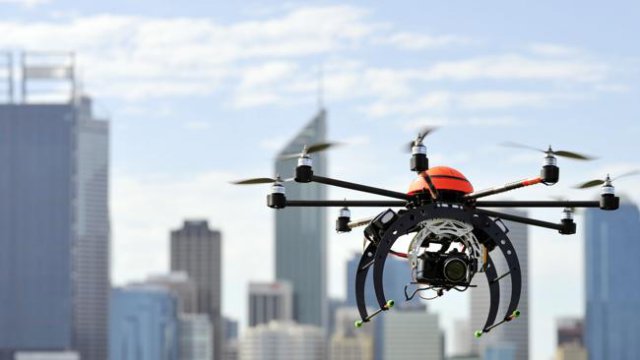 South Australian police will use sophisticated remote-controlled UAS to spy on suspects as it takes the war on crime to new heights.The stealthy miniature unmanned aircraft systems (UAS) will be equipped with still, video, and infra-red cameras.
South Australian police will use sophisticated remote-controlled UAS to spy on suspects as it takes the war on crime to new heights.The stealthy miniature unmanned aircraft systems (UAS) will be equipped with still, video, and infra-red cameras.
SAPOL will open a tender process to purchase four “off the shelf” commercial quadcopters that could be used to spy on bikie fortresses, find drug crops, and to gather intelligence without putting officers at risk.
Civil libertarians have protested the use of such devices saying they effectively mount to ‘Big Brother in the sky’ and could be used to monitor law abiding citizens in situations such as political protests.
However, Police Minister Michael O’Brien said UAS have become a recognised policing tool throughout the world.
“UAS represent a cost effective solution for a range of policing operations, especially in situations when using conventional aircraft is too dangerous or costly,” he said.
“They can be fitted with a variety of cameras, can be deployed in minutes, and can fly at heights that effectively make them inaudible from the ground.
“Images from the on-board cameras can be transmitted in real time, giving police a significant advantage during incidents and operations, often in situations when manned, conventional aircraft can’t be used.
“The quadcopters are also ideal for quick inspections of towers, buildings, or premises when police are searching for explosive devices, or after a fire or an explosion.
“And, the UAS have excellent capability for use in areas of rugged terrain, especially during searches for missing people or for illicit drug crops.”
In the UK, where UAS are already in use, officers control the aircraft with a remote control. The officer wears goggles that displays exactly what the aircraft is filming.
The cost of the UAS, along with pilot training and CASA licensing, is expected to be about $200,000.
Australian Council for Civil Liberties president Terry O’Gorman has warned the “eye in the sky” could make people afraid of attending protests and could be used to track people without their knowledge.
Mr O’Brien said privacy concerns will be addressed in a “similar manner to other police aerial operations”.
About 34 organisations across Australia are certified to use UAS for activities including aerial photography, surveying and power line inspection.
Source: Herald Sun
